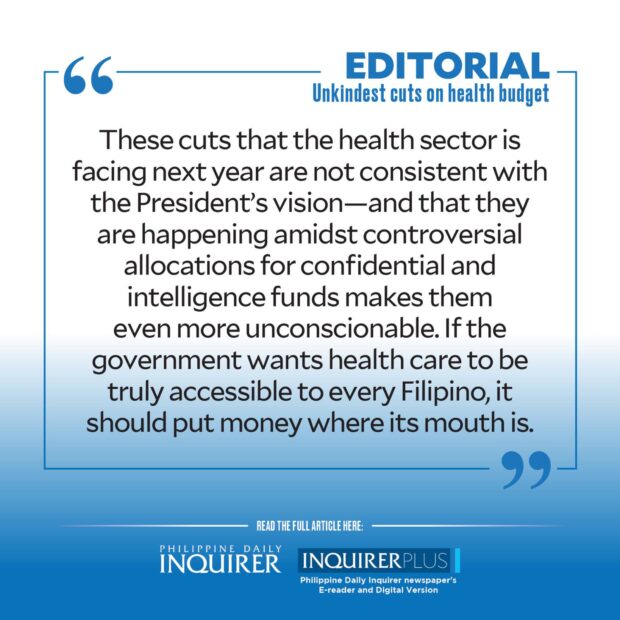Unkindest cuts on health budget
There are already so many items that do not make sense in the 2024 national budget that is currently being deliberated in Congress. Here’s another one: the multimillion budget cuts that the country’s specialty hospitals, whose budgets are already insufficient to start with, could face once the final national expenditure program is approved.
Under the proposed P5.768 trillion national budget for next year, a total of P818 million was slashed from the annual funding of the country’s four major specialty health facilities, namely, the Lung Center of the Philippines (LCP), National Kidney and Transplant Institute (NKTI), Heart Center of the Philippines (HCP), and Philippine Children’s Medical Center (PCMC). The Department of Health’s (DOH) recommended allotment for next year likewise dropped to P199 billion from P209 billion this year. This is ironic for what has been dubbed as a “post-pandemic budget” that is supposed to strengthen the health system and channel more resources to the health sector that was severely crippled by COVID-19.
Article continues after this advertisementPCMC, a major facility that hosts the largest ICU for children in the country, is set to suffer the biggest cut among the four with its budget slashed by P720 million, from P2.1 billion this year to P1.4 billion in 2024. The Department of Budget and Management (DBM) said the cut was due to the hospital’s failure to complete its ICT (information and communications technology)-related proposal.
The cuts for the other specialty hospitals were also significant: NKTI, P442 million or to P1.2 billion from P1.7 billion; HCP, P316 million or to P1.8 billion from P2.1 billion; and LCP, P274 million or to P561 million from P835 million.
The DBM explained that the budgets allocated to these hospitals were “similar to what they proposed” for next year. This is neither a consolation nor an acceptable reason especially since the Marcos administration has made affordable health care for all one of its priority agendas. This includes improving Filipinos’ access to quality and efficient health care and strengthening the country’s health systems. That these hospitals—facilities that provide assistance to those who cannot afford specialized health care—are set to receive lower budgets next year while billions are earmarked for confidential and intelligence funds—whose purpose is not made known to the taxpaying public—makes it the unkindest cut of all. The budget for these hospitals and the health sector in general should even be increased given the rising cost of goods, including medicines, as well as the increasing number of people who would need the government’s assistance. Globally, lung, kidney, and other forms of cancer have been on the rise—in the Philippines, cancer is the third leading cause of death, particularly lung cancer.
Article continues after this advertisementThe limited budgets allocated to these hospitals are also not aligned with President Marcos’ mandate to establish satellite specialty hospitals so that people outside of Metro Manila, where the four major facilities are located, can have access to quality health care. In fact, Mr. Marcos signed only late last month Republic Act No. 11959 or the Regional Specialty Centers Act, which mandates the DOH to establish specialty health centers in its hospitals and in government-owned and -controlled facilities. These specialty centers are mandated, under the new law, to prioritize cancer, cardiovascular, lung, and renal care, as well as kidney transplants, among others. But what is to be the fate of these specialty centers if even the four major facilities are already facing deep cuts in their budgets?Aside from these specialty hospitals, the Medical Assistance to Indigent Patients has also been reduced by P10 billion, or to P22.2 billion next year from P32.6 billion this year. This program provides medical assistance to poor patients seeking consultation, rehabilitation, examination, or confinement in government hospitals. The prevention and control of noncommunicable diseases, another major component of the DOH budget, is also facing a P1.2 billion cut to P1.7 billion from this year’s P2.9 billion. House Deputy Speaker Ralph Recto, one of the lawmakers who pointed out these cuts on health and social services, said the “big payroll and overhead in maintaining a large bureaucracy, plus rising debt service” were to blame.
May the lawmakers bequeathed with the power of the purse be reminded of what Mr. Marcos said in his first State of the Nation Address: “[B]eyond the issues that the pandemic has brought, the need for a stronger health care system is self-evident. We must bring medical services to the people and not wait for them to come to our hospitals and health care centers.” These cuts that the health sector is facing next year are, therefore, not consistent with the President’s vision—and that they are happening amidst controversial allocations for confidential and intelligence funds makes them even more unconscionable. If the government wants health care to be truly accessible to every Filipino, it should put its money where its mouth is.

















